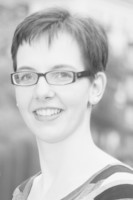Ulrike Löffler
Ulrike Löffler studied history, English language and literature as well as pedagogy in Jena. During her university years, she worked as teaching assistant and student aid in the field of 20th century history. She spent the academic year 2012/2013 at the University of California, Berkeley as Visiting Research Scholar studying the university’s contemporary reactions towards National Socialism. From 2014 to 2016 she was on the academic staff of the chair of Public History in Jena. Since March 2017 she has been a research associate and doctoral candidate at Europäisches Kolleg Jena.
Contact
Research project
The Pedagogy of Memorial Sites in Germany. An Investigation into Attempts at Teaching about National Socialism since the 1980s (working title)
Social movements are a known characteristic of the 1980s in West Germany. Next to the more prominent ones, there was a lesser known and much smaller grassroots campaign that advocated and fought for the installment of concentration camp memorials throughout the country. Albeit small, the movement was not at all unsuccessful: During the 1980s new memorial sites and exhibitions were set up among others in Flossenbürg, Essen, Neuengamme, Breitenau, Papenburg, Wewelsburg and the existing ones were revised and enlarged as in Dachau and Bergen-Belsen. Since then, the number of memorial sites across Germany has grown continuously, accompanied by the development of memorial site pedagogy (“Gedenkstättenpädagogik”) into a quasi-independent subfield of pedagogy. However, a historical perspective on the pedagogy of memorial sites is still missing. The PhD project aims to fill this research gap with a comprehensive study of the concepts, contents, aims and methods as well as rationales of teaching about National Socialism at German memorial sites since the 1980s. It can, thus, be positioned at the intersecting fields of history, history of education and didactics of history.
In analyzing how the history of National Socialism was presented and taught at memorial sites, it is important to appreciate the role of the individuals involved in that work since their varying backgrounds, priorities, implicit theories, individual motivations and understandings of the broader topic decisively shaped the respective concepts and contributed to their specific rationales. For this reason, the study partly follows an actor-centered perspective.
Research interests
NS research
Cultures of history in Germany and the USA
Didactics of history teaching / Holocaust Education
History of Education
